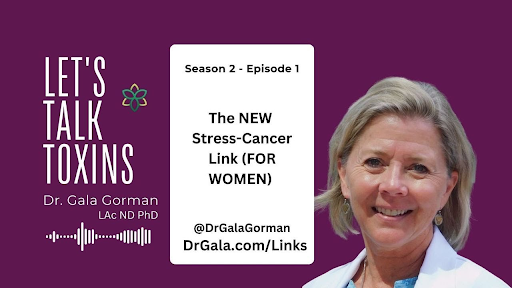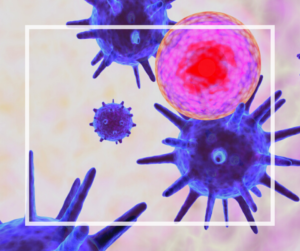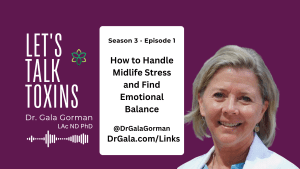NOTE: A machine generated this transcript. Please be aware that it may contain occasional errors in punctuation and spelling.
Chronic stress disrupts hormones in the body and speeds up cancer growth. When you’re under stress, the body releases hormones that switch on tumor growth pathways, making cancer cells multiply faster. It changes nearby healthy cells to create an environment where tumors can thrive. It basically increases the chance of cancer spreading and helps it hide from the immune system making treatment less effective.
Welcome to the Let’s Talk Toxin show. If you’re like me, you know several women who have had their lives interrupted by cancer. It’s important to be proactive and practice cancer prevention. But what really works? In this episode, we’re exploring the connection between chronic stress and cancer. Essential insights every woman in midlife should know to protect health long-term. Are you wondering how stress impacts your body and what steps you can take to support resilience? Well, stay tuned because managing stress effectively could be the key to ensuring lasting wellness. Sometimes it’s the simplest lifestyle adjustments that make the biggest difference.
And if you’re new here, I’m Dr. Gala Gorman, a licensed acupuncturist, naturopath and author of “What’s Your Kryptonite?”. I wrote the book to help women understand the effects of chronic stress that’s turned toxic. In the book, I share the MOLT Method™ I developed to make it easy to shed stress along with the accumulated toxicity, just like any other creature in nature that’s outgrown its trappings.
Many women find their way to me after trying everything to deal with their annoying symptoms. You’ve learned more than you ever wanted to know about health most likely, and still aren’t healthy. It’s time for a different approach. Symptoms are directly related to stress, but stress isn’t easy to master, and it isn’t going away. If you’re ready for a new approach that will lead to stress mastery, I highly recommend my MOLT membership. It’s perfect for those who have a strong sense they’re missing something important that’s the key to optimal wellness.
In the membership we apply the MOLT Method™ I developed. MOLT is an acronym, M is for mindset, O is for order, L is for lifestyle, and T is for toxins. It’s designed to help you shed stress, cruise through midlife symptom free and issues like chronic fatigue, insomnia, and weight gain. So join us and turn your knowledge into real change.
So, in this next segment, I will refer to toxin trends, and I will share information from research studies related to toxicity. So, as I mentioned a moment ago, the T in MOLT stands for toxins. And I can say with confidence that every symptom is caused by accumulated toxicity. I evaluate 12 categories of toxicity when I’m working with someone to unravel a health mystery. Our world is full of man-made substances that our bodies were not designed to deal with. Coupled this toxicity with an overwhelming amount of toxic stressors, the body was designed to manage. And it’s no wonder women find themselves playing whack-a-mole with symptoms.
Here’s a report, it’s referring to parasitic toxicity. This is one of the 12 categories that I actually look at. This article explores the dual nature of parasitic infections in humans and highlights both their harmful and beneficial effects. What? Parasites are beneficial? Well, there’s over 300 species of parasites that can infect humans and parasitic infections are traditionally studied for their pathogenicity and toxic effects, meaning you know that they’re not good for you. But recent research has uncovered potential positive impacts of parasites on the human body.
These benefits might accumulate from the production and release of metabolites that basically byproducts or off-gassing essentially as the parasites do their thing in the human body. So, they’re triggering the body’s immune response. And so, the up-regulation of the immune response basically is creating potentially positive byproducts and side effects.
The study emphasizes the importance of understanding the interactions comprehensively. And so there’s more exploration that’s being done. The findings suggest that certain parasites can hold promise in actually supporting the treatment of diseases. And could even be better than conventional pharmacological treatments or medications that really are not very effective. So this emerging field is often referred to as Helminth therapy, H-E-L-M-I-N-T-H.
And it investigates how parasites might be used to regulate immune responses or combat autoimmune, or even inflammatory diseases, other kinds of inflammatory diseases. So, despite the persistent challenges posed by parasitic infections globally, this study underscores the potential for leveraging the positive effects to develop innovative medical treatments.
And that’s what I’m all about. I’m all about innovation, using technology and innovation to basically improve the outcomes and to eliminate the side effects of the treatments that are often turned to in our standard medical system.
A deeper understanding of these processes could pave the way for groundbreaking therapeutic approaches. So just a few of the key benefits that they’re finding of, essentially this study of parasite, of the effects of parasite on immune modulation were basically helping to regulate the immune system. Parasites can modify the host immune response, potentially creating therapeutic benefits for autoimmune and inflammatory conditions.
So that’s, I’m just kind of echoing what we just talked about. But another really interesting thing is that the parasites produce metabolites and this may actually have a beneficial effect on human health. More unconventional medical applications might be using parasites as tools for treating diseases that are resisting traditional medication intervention. And so this really, again, gives us hope that something that we initially thought was bad would be basically used for good. And essentially, this is what happened in the initial creation of antibiotics. And so this is not a completely new concept but definitely shows how we just need to look at things a little differently and have open minds as we consider options for our health and reversing aging. Reversing the effects of chronic stress, essentially.
Chapter 12 in my book “What’s Your Kryptonite?” is dedicated to helping readers manage what I refer to as Tricky Toxins. Our bodies are bombarded with toxicity. So we have to learn to manage it. Just comment, Tricky Toxins, and we’ll send you a link where you can download the chapter for free. If commenting isn’t convenient, go to DrGala.com/Links and sign up for my Wellness Weekly newsletter. You can respond to any email you received from me with Tricky Toxins, and we’ll send you a link.
In this next segment, I’m opening the kimono to share how I was challenged to apply my suggestions. I’m Walking My Talk, and here’s an example. Every suggestion that you hear from me has been tested in the trenches.
And that includes saying no to symptom suppression. Over the past four decades, I’ve developed processes that work sustainably. Typically it requires a combination of approaches that I’ve synthesized to address the health issues that show up repeatedly for many women.
Recently I had an opportunity to Walk My Talk, when my stress had built and lowered my immune system. This made me susceptible to any pathogen or little critter that I was exposed to in my environment. I actually got a cold. Not sure what it was. I didn’t bother to test, but it was a cold and because of the chronic bronchitis that I struggled with for many years, I recognize when it’s going into my lungs, and I try to arrest the development of it quickly. We don’t want it to escalate, and the only way we’re going to stop it from doing that is if we catch it really early on.
I did manage to catch it pretty quickly. Just know that stuff happens. We are never going to be completely immune from catching anything. We need to be prepared and have what we need handy because even if we’re on a wellness protocol, if something like this happens, you’ve got to stop your normal protocol, which is what I did.
I started a different protocol that is designed to deal with an acute situation, meaning like the onset of something that is anticipated to come and go in a week or two. And so, I stopped my protocol that I was on, created a new protocol and started that new protocol. Within a few days I was feeling much better. It took me a bit of time to completely feel like I had cleared my lungs, but generally speaking, it came and went, and it did not affect me much.
It’s important to know that you can’t expect that nothing’s going to happen, but you do need to be ready at the first signs, which means you need to make sure that you’ve got your home apothecary pretty much stocked up with what you know you’ll need for this kind of situation.
Just know too that you need to have patience and support your immune system while it figures it out. This is one thing that I learned decades ago and really got me over the chronic bronchitis that I had struggled with since I was a child. What I found was that I had to let my immune system, my body’s own immune system, figure it out. So, I have to be patient enough to go through that process and so iff you’re reaching for medication, even over-the-counter medication, to essentially try to squash your immune system’s reaction, you’re going about it the wrong way.
We want to let our immune system get the job done, educate itself in the process. The kind of protocol I’m talking about using here is things that are just really going to support your immune system. Once you get through it, your body is going to be stronger and healthier, having experienced this situation.
Now, let’s talk about how chronic stress impacts not only how we feel but how it raises the risk for serious health issues like cancer. And when I’m done, drop a comment and let me know what you’ve experienced when you’ve struggled with stress over time, and what strategies have helped you feel more balanced and resilient?
So let’s start by reminding you of something that I talk about regularly. If you’re new to my world here, then you may be hearing this for the first time, but stress causes 90% of disease. A research study in the journal of biomedical science in 2023 showed that chronic stress disrupts hormones in the body and speeds up cancer growth if you’ve got this going on already. When you’re under stress, the body releases hormones that switch on tumor growth pathways, making cancer cells multiply faster.
It changes nearby healthy cells to create an environment where tumors can thrive. That sounds a little opportunistic, right? Parasitic. Speaking of what we just talked about a few moments ago. It basically increases the chance of cancer spreading and helps it hide from the immune system making treatment less effective. So, if you don’t believe me that stress causes 90 plus percent of disease, there have been researched studies that have correlated stress to disease.
I don’t believe that 90% is an accurate number. I actually believe that statistic is higher because I don’t believe they include every form of stress and every way stress shows up. This is just a wake-up call for you. If you feel like you’ve seen signs of stress accumulating, just know that now is the time to take this seriously so that stress doesn’t escalate to something as serious as cancer.
Stress hormones cause cancer cell activation, they basically have proven this in studies. Chronic stress can seriously impact your health, especially during midlife. Studies show that it’s more constant stress that keeps your stress hormones elevated, like cortisol, and this damages your DNA and reduces your body’s ability to protect itself from the harmful cells. The unhealthy cells have been triggered and are over-activated in certain pathways in your body. This creates an environment that makes it easier for diseases, including cancer, to grow and spread.
According to a study, women in their midlife deal with high stress levels, as they experience multiple challenges. These challenges include trying to balance family roles and work-life balance and even trying to figure out what you’re going to do with yourself now that you’re an empty nester. These may be issues that you’re experiencing that are being compounded with your own health issues or even financial pressures.
The most reported challenge includes dealing with divorce or the death or health issues of parents. Menopause is rarely seen as the main issue, but it is essentially a triggering issue that kind of pushes you over the edge where you might’ve been able to manage all this stress before. As we go into menopause, our body really needs some extra resources to be able to manage that transition, the hormonal transition.
If you don’t have any extra resources available, then menopause ends up being a really bumpy ride and could be essentially the triggering thing for some of these other diseases to use as an opportunity to take hold.
Many women struggle to find balance, trying to navigate these stressors. So it’s important to identify some support that you can count on and to begin to work, to understand better, highlighting the importance of tailored support and understanding for diverse midlife experiences. So it’s important to develop support and increase your understanding of what’s going on and your awareness, even for the stress as it’s escalating in your body, because once you’re aware of it, then you will also be aware when you’ve done things that have worked to keep stress in check.
A recent study in Cancer Cell and this was recent this year in 2024 reveals how chronic stress might increase the spread of cancer. This offers important insights for women in midlife. Here’s what they found, chronic stress triggers white blood cells, specifically neutrophils, to form sticky web-like structures called NETs. These NETs, part of the immune system’s defense against infections, create an environment that makes it easier for cancer to spread.
A couple of years ago, in a 2022 study published in Experimental Hematology and Oncology, they uncovered how these sticky webs may play a surprising role in cancer development. NETs are part of the body’s defense against infections, but they can also support tumor growth, spread cancer, and even create blood clots linked to cancer.
How NETs are formed isn’t fully understood, making precise treatment difficult and even tricky. As you can see getting a handle on this toxicity that our body asked to manage is really important. So remember, you can get the Tricky Toxins chapter of my book, “What’s Your Kryptonite?” for free. Just comment, Tricky Toxins, then, we’ll send you a link where you can download the chapter.
If commenting isn’t convenient, go to DrGala.com/Links and sign up for my Wellness Weekly newsletter. You can respond to any email you received from me with Tricky Toxins, and we’ll send you a link.
Let’s continue with a couple of things you need to understand about chronic stress to protect your health long-term. And don’t forget, when I’m done, drop a comment to share your stress relief tips, you’re thinking of trying and why.
Next, I want to talk to you about inflammation and immune dysfunction, because you may be recognizing from what I talked to you about a moment ago, that cancer development really is an immune system dysfunction. A disruption of the immune system is a common challenge for women in midlife. It causes ongoing inflammation and suppresses immune cell function. It reduces the body’s ability to fight illness and really creates the conditions that encourage cancer to develop and spread.
So stress management really is the key and it is the intervention that is going to make the difference for you. I wrote a paper quite a few years ago. And one of the studies I referenced in this paper was some research from 1946 by Dr. Carolyn Bedel at Johns Hopkins school of medicine. And she gave students personality tests to create a psychological profile that could be used and studied over a long period of time.
So imagine, you know, you need to start with people that are younger if you want to be able to track this over a long period of time. And what she found was a high risk of developing cancer was correlated with certain feelings and personality traits. The most telling was an inability to recover from a traumatic event. If depression persisted after the event, the person typically developed cancer within a year or two.
And this really was proven out over a very longterm study. So, you know, this was not just a one or two examples to draw from. This was shown repeatedly. So what I often say is that when you’ve experienced something that really has thrown you, you feel sad or, you know, even depressed, feeling all those emotions and sitting with it can be helpful, but don’t get stuck there. And you can see, she said that within a couple of years, these people developed cancer.
So if you’ve been really struggling with something for more than, I would say, three to six months, it’s time to seek some professional help to help you work through this. And you want to do that, it’s going to end up saving you a lot of heartache in the long run. The goal is to provide symptom relief quickly along with establishing a treatment protocol that will address the underlying cause longterm.
And so this will most likely involve some kind of counseling because the emotional component of disease and the correlated stress that goes along with it is the linchpin typically that determines whether your body is going to recover from something or won’t be able to. Even for those people who do go through cancer treatment and may managed to get through it. They find that they are the ones that actually relapse and have a recurrence of the cancer and this tends to be pointing to some form of toxicity that was never addressed. And it could even be emotional toxicity.
Again, emotional toxicity is one of the 12 categories of toxicity I evaluate. So, we need to do this in a way that really gives our body the support that it needs so that if you have had to go through a really traumatic event, you can take the benefits from it. We’ve always got things that we have learned and that, you know, we can take forward with us to improve our lives.
But we can’t afford to get stuck there and then have dis-ease escalate to disease and then we don’t really get to have all the benefit from these learning lessons that we’ve experienced.
A couple of times in this episode, I’ve talked to you about my MOLT Method™ Program and the T in MOLT stands for Toxins. And I evaluate 12 categories of toxicity in an assessment I refer to as a Metabolic Energy System Assessment. But the 12 categories of toxicity are bacterial, chemical, emotional, food, fungal, heavy metals, mycoplasma, mycotoxins, parasitic, viral. And so those 12 categories of toxins, all of them tend to contribute to our toxic accumulation, our body, but it’s the emotional toxicity that can be the trickiest to deal with.
The answers I give to questions I receive quite often apply to and would be helpful for most women. I’ve accumulated a few related questions here and if you’d like to ask a question, I created a form so that it’s sure to get answered. And your question could be shared in a future episode, helping many other women, so comment “QUESTION,” and we’ll get you a link to the form.
If commenting isn’t convenient, go to DrGala.com/Links and sign up for my Wellness Weekly newsletter. You can respond to any email you receive from me with “QUESTION” and we’ll send you a link.
What actually is cancer and what isn’t it?
What cancer is, is when cells in your body start growing uncontrollably and form lumps or tumors. These really could be just cells that should have been killed and basically discarded by your process of elimination, but your body’s systems were not working properly. Basically, they just start to clump together. It can occur almost anywhere in the body and often starts due to damaged DNA within the cells.
What’s not cancer is something that you can catch from someone else. It’s not like a cold or flu. And just because someone has cancer doesn’t mean it will spread to you. Just know that if left untreated, cancer cells may spread to other parts of the body through blood or lymph systems. And this is when cancer basically escalates to metastasis.
One of the things I will say is that we use intermittent fasting and particularly lean into longer periods of digestive rest. And one of the reasons we do that is because it stimulates a process in the body known as autophagy. And autophagy is essentially where your body has the resources it needs to be able to flip the switch and turn on this process that goes in and cleans up a lot of these errant cells and this accumulation.
And so you want to be leaning into autophagy fairly often. The premise is that autophagy doesn’t really start until about 17 or so hours with no food. So as you can see, the way we’ve been taught to eat three meals a day, literally our body would never go into autophagy. We also need protein, and I recommend consuming meat-based protein because that’s the most efficient way to get your protein consumption, but eating protein also shuts down the autophagy process.
And so it can be really important to consolidate your period of time that you’re consuming protein and that you’re consuming really any food so that you make sure you give yourself at least a 17 to 18-hour window of time of digestive rest so that this autophagy process can kick in. That’s why I typically recommend that you adhere to a six-hour eating window most days and throw in a couple of days of one meal a day and potentially even use longer periods of fasting from time to time to give your body even more of an opportunity to use the autophagy process and really get a lot of this cleanup work done.
What exactly happens to our hormones under chronic stress that speeds up cancer growth?
Well, as we know, stress hormones fuel cancer growth. I talked about this in the episode on stress and cancer connection. Chronic stress elevates cortisol and the catecholamines and this activates pathways that speed up cancer cell growth. The hormones change the environment around healthy cells making tumors grow easier.
Stress hormones also help cancer evade immune detection, reducing treatment effectiveness. If you’ve been listening to me a while, you know, I often say that stress takes the immune system offline. So this is the correlation, when stress takes the immune system offline, anything you’ve got going in the body that is essentially hanging out, being kept at bay by your immune system well now, when stress escalates your immune system steps aside, and all of that is able to kind of take hold and get a foothold and then start gaining some momentum. This is exactly what we don’t want to happen.
How does long-term stress weaken the immune system and make cancer more likely to grow?
Well chronic stress creates low-grade inflammation that weakens immune defenses. Immune cells become less effective allowing cancer to grow more freely. As a reminder, stress takes the immune system offline and when the immune system essentially is offline or kind of sidestepped, then everything has a little more of an opportunity to get some momentum in your body.
Inflammation promotes a supportive environment for cancer cell development. That’s just really the bottom line. And so you really want to keep inflammation in check and the way you do that is by keeping stress in check. Stress basically shows up in many different ways including toxicity, toxicity is creating internal stress. You can’t think that you can meditate your way out of this.
What are some proven ways to manage stress to lower my cancer risk or improve my outcomes if I’m already in treatment?
So I will just say that if you’re already in treatment, then this is even more important for you. You need to really do anything you can to offset the stress that treatment is causing for you. And so any other stress that is at all optional or controllable simply must go during this time. You can’t try to manage your normal life and go through cancer treatment at the same time, you are basically stressing your body even more than the treatment is already stressing your body. And that is a recipe for disaster. Stop and focus on your cancer treatment.
So cancer prevention and recovery really involves all sorts of methods that you can use to not only get through the current situation, especially if you’re already in treatment. But if you suspect that you’ve got some disease brewing, you know, that you need to take this really seriously and use every tool in the proverbial toolbox to mitigate stress.
So some of those ways that we commonly think meditation, exercise, particularly more gentle forms of exercise like walking and yoga, deep breathing, those things really help to reduce your stress, regular exercising, even hobbies, connecting with loved ones or joining a support group. All of these things are really helpful.
One of the things that’s super helpful in reducing stress levels is taking part in activities that manufacture oxytocin. So you can create an oxytocin rush intentionally, just loving on your pets or connecting with loved ones or friends, you know, anything you can do to feel connected will really produce oxytocin. And as oxytocin goes up, cortisol goes down and this will soothe your system and allow your immune system to get back to functioning a hundred percent.
If you find that you’re really having a challenge getting stress under control, then I wholeheartedly recommend working with a mental health counselor, a therapist that can help you with some techniques, including potentially cognitive behavioral therapy that will just help you to sort of get your head around it and think of ways to approach it differently.
Sometimes, an attitude adjustment is really the most important thing to get through a challenging situation. And another reminder is that stress does not just come in the form of mental and emotional stressors, but also other forms of toxicity. And so you really want to make sure that you’re addressing not just the mental emotional ways stress shows up, but also potentially other forms of toxicity.
Are there specific signs or symptoms related to chronic stress that I should watch for which could indicate an increased risk of cancer or other health issues?
Well, there are definitely some warning signs of stress that I would recommend you pay attention to. The first one would be sleep issues. So when your sleep gets disturbed, when you’re having trouble falling asleep or staying asleep. This can be a sign of stress affecting your health. Honestly, all your repair and maintenance in your body is done during your sleep, the majority of it.
And so if you’re not sleeping well, your health will decline. There’s just no two ways about it. And so if you are having a challenge sleeping, I’ve got a lot of videos on my channel about how to improve your sleep and how to deal with insomnia, particularly in midlife. And so I would point you to some of those other videos, just go to my channel and make sure you subscribe, but search my channel for insomnia or sleep and you’ll find a lot of additional content to help you work on this in particular, because sleep must be happening. And it’s really like a hard stop.
And I do not recommend that you resort to medication to improve sleep. The side effects are going to create more problems than the sleeping is going to solve for you.
The other thing to pay attention to is headaches. If you’re getting frequent tension headaches, these can be linked to ongoing stress. And really headaches, I’ve got another video on my channel about headaches and how the location of a headache correlates to what’s actually going on in your body. So again, that’s just another thing to check out if you’re interested, if headaches are a thing for you and a problem that you deal with regularly.
And then mood swings. So if you’re just feeling more anxious or irritable, it could be a sign that stress is building up. And as I’ve talked about in some of my other content and the episode on cancer and stress, just know that if we allow like emotionally stressful traumatic events to debilitate us, that it’s a very common occurrence for cancer to materialize down the road as short as a year or two.
And so if you are finding that you’re having these mood swings and maybe you know they’re related to some traumatic event, know that a traumatic event could be something as seemingly untraumatic as losing your job. It doesn’t mean you had to get in some horrible car accident or witness the twin towers falling down. Just even living in a stressful situation is enough to basically trigger this. So you just want to really watch out for what I refer to as these stress red flags.
What types of cancer are most commonly associated with chronic stress in women? And should I be more vigilant about any specific symptoms?
Well, stress and cancer go hand in hand. There’s just no two ways about it. Breast cancer is probably one of the most common ways that women develop cancer, particularly related to stress. Chronic stress can disrupt hormone balance and this increases the risk. And so, of course, you want to watch for lumps and changes in size of your breasts or any unusual pain. I will also say that it’s very common for women to develop breast cancer after some really emotionally traumatic time.
Sometimes, this happens after a divorce or the loss of a child, that sort of thing. And so you’re definitely going to want to deal with any sort of trauma or even lingering depression that you’re experiencing because there has been a correlation between stress and cancer. You’re going to want to go watch the whole episode on stress and cancer.
But there’s a correlation that shows that lingering depression, the inability to deal with a traumatic event and sort of process it and move through it is a clear sign and correlates to developing cancer within a year or two.
The next type of cancer is ovarian cancer, this is also caused by stress-related inflammation in particular. So, be alert for bloating or pelvic pain, or even changes in appetite can sometimes point to a problem here. Also, colorectal cancer. So, prolonged stress can affect digestion and gut health. So, you want to look out for changes in your bowel habits.
Just know that your normal bowel movement should happen between 5:00 and 7:00 AM, in the morning, and you should feel like basically having a bowel movement when you wake up and it should feel complete. This typically is a challenge for a lot of women in part because we don’t sleep really soundly and that rest and repair process is when kind of all of that is building up.
And then when everything kind of turns back on around five o’clock in the morning, then by the time you get up, you’re ready to have a bowel movement. That’s the way it’s supposed to happen. If that’s not happening, just know this is something that you definitely want to work on improving your gut health.
Another thing to watch for is blood in stool. And so sometimes blood in your stool will show up as dark stools because basically dried blood looks dark, right? The thing I will point out here though, is that if you’re taking any sort of supplements, they can change the color of your stool. And don’t be too alarmed if you’re seeing something that abnormal. If you stop the supplements and your stool returns to normal color, then you’re okay.
Also just any sort of abdominal discomfort, if you’re having any sort of pains that have been showing up with regularity and haven’t been checked out by a doctor, then that’s your first stop. That’s the first thing that you need to do, just to rule out that anything really is going on that there’s any sort of disease accumulation.
How can I recognize when my stress levels are becoming harmful? And what steps should I take to address it?
So constant fatigue or frequent headaches, muscle tension, all of these really indicate that stress has escalated to harmful levels. And so, if you’re one of those people who just wakes up tired, then know you’ve got stress that is interfering with your sleep and is impacting your health.
Frequent headaches, this is something you should not have frequent headaches. If you’re having frequent headaches, there is something else going on that needs to be addressed. And muscle tension, this is something that can often be helped by just moving more in a more mindful way. One of the things that I do to relieve muscle tension is I walk on a treadmill desk so that I keep moving when I have to work at my desk for long periods. So that can really help with the muscle tension. But all of these are signs that you have stress accumulating.
The other thing would be emotional changes. So increased irritability, anxiety, difficulty focusing may also signal a stress overload. If you’re finding that you’re forgetting things regularly, or even having problems like if you’re talking about something and you’re just not able to find that word it’s like on the tip of your tongue. It’s one thing, if it happens occasionally it happens to all of us, but if you’re finding that it’s happening with regularity, then that’s a sign that you need to take a break.
And you may even need to take a you know, 10-day, week long, 10-day totally off the grid, little mini retreat and really give yourself a full blown unplug from all of the stressors of your life.
The other thing to look at is behavioral shifts like overeating or procrastinating, avoiding responsibilities, or even relying on unhealthy habits can be warning signs. You know, you may find that you’re watching too much TV when you know you’ve got other things to do or even drinking an extra glass of wine because you feel like you need it to really wind down.
Those are signs that your stress is too high. And typically the things we’re using to reduce the stress are creating more toxicity in the body, which is leading to more stress. So you’re not really accomplishing what you’re setting out to accomplish.
Remember, if you’d like me to answer your specific question, make sure to comment “QUESTION”, and we’ll send you a link to the submission form. You’ll want to subscribe to the channel notifications to get regular updates. This has been the Let’s Talk Toxin show. Make sure you subscribe to my channel on YouTube and activate the notifications. You’ll get a reminder when I’m going live next.
Until then, be well.













